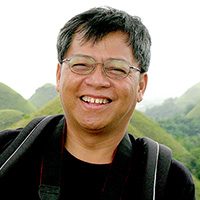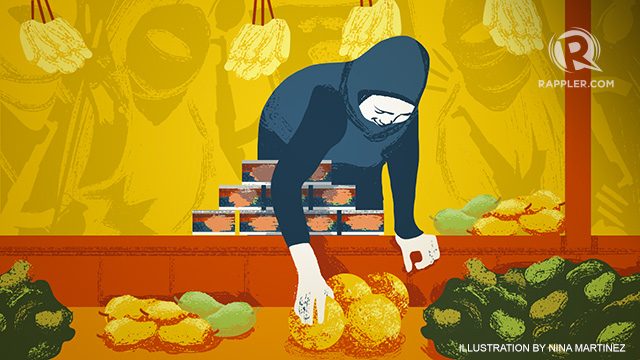SUMMARY
This is AI generated summarization, which may have errors. For context, always refer to the full article.

Back when I was doing the Davao and Cagayan de Oro part of field research for my dissertation, I would visit my family in Ozamiz City to take a break, come up for fresh air and savor some of that long-yearned breakfast of puto maya, mangoes, and sikowate.
I would take Bachelor Express’ slower “stationery” service (this English word is wonderfully indigenized to mean, the bus stops on every town bus terminal – hence “station” to “station,” as if one were making the “Station of the Cross” in church), and made sure I have enough time to go down to have my painit (snacks) of pan de monggo and kape barako from Bukidnon at the old Iligan terminal.
The other reason why I stopped at the Iligan terminal was I wanted to buy a kilo or two of baboy sulop for the family. The wild boar’s meat was being sold in a small stall beside the terminal, owned by a Maranao who declared me his favorite aki after I bought the meat from him a couple of times.
We always started our malangas na inakola (friendly haggling) over the price, and in my vain effort to bring the price down, I’d rib him in Bisayan, “Aki, nganong namaligya ka man anang baboy sulop nga haram man na.”
He was ready for that and would push back: “Aki, ang ingon sa Koran dili ka maka-kaon ug baboy. Pero wa mi-ingon ang Koran nga dili ko makabaligya ug baboy!”
(I would hear about these similar naught asides all over Southeast Asia. In Indonesia, Muslim friends of mine would rationalize drinking beers with me by saying that the Koran said do not get drunk. “So I can drink, Pak, as long as I do not get drunk. Which I never am!”)
This exchange would go back and forth until the bus conductor called on passengers to go back to the bus so it could head to Kolambugan, cross Panguil Bay and be in Ozamiz before dark. I’d buy 4 kilos of the meat, and ask the owner’s permission to leave (“modas ako, aki”): a Maranao way of respectfully saying goodbye to a friend.
I never thought much of those conversations with my suki, since I grew up in a town where the presence of “smuggled goods” was part of the everyday life of all sorts of people, including the Maranaos.
“You need to get some top quality Indonesian malong? Go to the mercado (marketplace). How about some bubble-gum tasting cheap Chinese toothpaste and the favorite Ma Ling (the Chinese version of spam)? You will find them at the mercado! Cadbury Chocolates and umbrellas from Singapore? Of course, at the mercado! And what about guns? Well…you can find that someplace else but it’s also near the mercado.”

Extensive network
I always thought this network was only particular to the Lanao del Norte, Lanao del Sur and Misamis Occidental grid until around 2008 when I found myself in the barter trade center in Zamboanga City. The Tausug vendor offered me cheap Chinese Viagra (P600 pesos lang, sir, at discounted pa!!) and a box of Malaysian Alicafe 5 in 1 Instant Coffee as freebie. I demurred, telling her that I knew it was fake as I’ve seen a lot of it in Quiapo.
She immediately assured me that this “Viagra” was tested and seen to have no negative effect. And what proof did she have? She pointed to a group of American soldiers who were then in Zamboanga assisting Philippine troops going after the Abu Sayyaf kidnap gang. And with a smile, she asked: “Ano pang ebidensya gusto mo, sir?” I ended up just buying the Malaysian coffee and a pirated DVD set of all the 5 seasons of The Sopranos. No Chinese “Viagra” (or was it Viagro?).
The DVDs were of good quality, and I remembered that one can also get similar films outside GeeGee’s movie theater in Ozamiz, in Cebu City’s busy Carbon district, and at Metrowalk in Pasig City. Moro women run these mini-marts and you wonder how powerful they are as you watch them order young boys all over to quietly approach potential buyers (DVD! Palit ka ug DVD, aki?) and serve as lookouts in case police raided these places.
That was when I realized the one other enduring admirable trait of Filipino Muslims – the value they place on the commodities they sell.
This knack at peddling these illegal consumer products is something that Manila’s “nattering nabobs of negativism” (Spiro Agnew’s famous description of the media) know very little when sharing their speculations and conjectures about Marawi to clueless anchors and talk show hosts.
The Filipino ummah is not only a community of devoted followers of Islam. It is also a hub in what I think is a nationwide network of traders of illicit goods. The Moro world is not just a region of hijabs and imams. It is a vibrant and complicated network that extends from Borneo to Baguio. And these communities will passionately defend their trade as well as the relationships that bind it.
Brainwashing won’t prosper
I am certain that if these fundamentalist thugs get the chance to consolidate their presence by establishing their offices in Marawi and environs, these centers of fundamentalist brainwashing will never prosper. The first to shoot at them will be the leaders of this smuggling network and the communities it serves.
It is therefore prudent for those involved in eliminating the Maute gang to keep this other talent of Filipino-Muslims in mind. The best way to get Maranaos suspicious of the state (more so now after the discovery of the dead bodies of civilians who went through army checkpoints) over to your side is to promise that once the Matue gang is gone, the trading will be restored. With these gangsters eliminated then it will be back to the business of selling Ma-Ling, Singapore umbrellas, malong, pirated DVD, Chinese Viagra, drugs and the occasional weapon in Marawi and in other towns in the Lanao del Sur-North Cotabato-Sharif Kabungsuan border.
And no matter how much the army or police consider these illegal, they will just have to swallow their pride and let it flourish again. For it is this trade that kept Marawi peaceful for a very long time, since the MNLF attacked the Mindanao State University campus in 1975.
Business will eventually prevail over fundamentalist garbage, and push it out of these trading zones. – Rappler.com
Patricio Abinales misses baboy sulop and his Maranao aki.
Add a comment
How does this make you feel?
There are no comments yet. Add your comment to start the conversation.